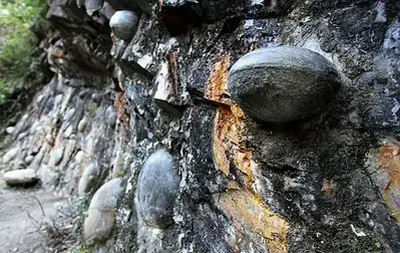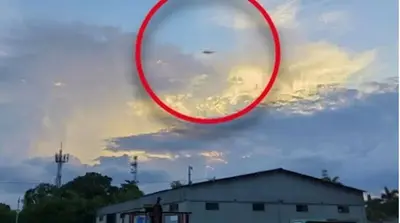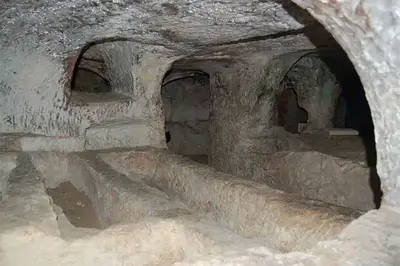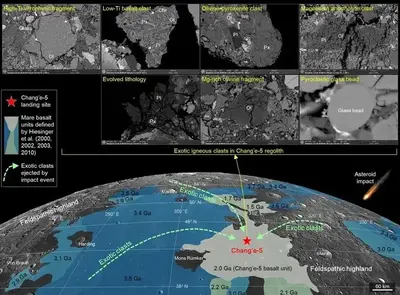History
A "Golden River" Suddenly Appeared In South Africa: NASA Satellites Accidentally Discovered
Recently, NASA shared a striking satellite image: in South Africa, what appears to be a sparkling "golden river" has suddenly appeared against the brown and barren landscape.
It almost looked like a giant art installation, as if someone had carefully placed the pure gold leaves into a pattern resembling a river on Earth.
However, that is not the case at all. According to Reuters, this “golden river” is actually the waste from the collapse of a dam containing toxic waste at a diamond mine in South Africa – once owned by De Beers, and now in a non-working state.
The dam collapsed on September 11, 2022 at Jagersfontein, South Africa. At around 2 a.m., a truck driver saw a crack in the dam and alerted the foreman, but no action was taken, The New York Times reported.

About four hours later, a stream of waste from the diamond mine spilled over the collapsed fence and injured at least 40 people, according to Reuters.
According to NASA, hundreds of Animals were killed by these wastes, and this “catastrophe” destroyed more than 160 homes.

The Jagersfontein mine is an abandoned open-pit mine located near the town of Jagersfontein in the Republic of South Africa. Since it was mined in 1870, two of the ten largest diamonds on the planet have been discovered here.
The fact that the NASA image was taken nearly a month after the initial disaster, shows that the impact of the dam failure lingered long after the initial flood.
This waste is usually a mixture of water; crushed stone; small amounts of metals including copper, mercury, cadmium and zinc; and additives used in the mining process, such as sulfuric acid and cyanide, according to Earthworks.
These wastes are usually stored as wet mixes behind compacted earth dams. Because waste can contain toxic metals, they can harm ecosystems if released into water bodies.
According to geologist Dave Petley of the University of Hull, the discharges from the Jagersfontein mine extend about 5.3 miles to the southeast and about a mile wide.
According to NASA, pollution has damaged more than 10 square miles of grazing land, entering waterways such as the Prosesspruit River and water systems used for domestic and agricultural use.
“Once again, ore waste has caused severe human and environmental damage,” Petley writes. NASA says the brightest spots in the satellite images probably don’t show liquid, but rather dry waste and sludge left behind when the water evaporates. As the spill dries further, wind and rain will begin to disperse the remaining residue.

About 9.6 million carats (1,900 kg) of high-quality diamonds were mined during the mine’s lifetime, interrupted only by the two World Wars and the Great Depression. After thirty-nine years of open-pit mining, local miners switched to underground mining around 1909.
There has been growing concern about the stability of waste dams in recent years after a dam collapse in Brazil in 2019 that killed more than 250 people, according to The New York Times.
The number of home collapses has increased in recent years, with half of all collapses in the past 70 years occurring between 1990 and 2009, according to Earthworks.
Waste dams are less stable than dams because they are a reservoir for waste. As a result, these dams are built over time and miners often cut costs during construction.
In the case of the Jagersfontein dam, unrest increased as the dam’s new owners began sorting through the waste for diamonds left over from the initial mining process, according to The New York Times.
De Beers sold the mine and waste to another consortium in 2010, and it was eventually controlled by Stargems, a diamond company based in Dubai.
In 2021, the mine was briefly closed when it was revealed that operators were storing more than two and a half times more waste than is safe behind the dam.

Research by historian Steve Lunderstedt in 2005 confirmed that the Jagersfontein mine is the largest manually dug pit in the world with a surface area of 19.65 hectares. Excelsior and Reitz (now known as Jubilee), mined from the Jagerfontein mine.
The Jagersfontein dam failure is just one example of the toxic legacy left by mining in South Africa. In fact, there are hundreds of other waste dams that exist in the country, according to the New York Times.
The Jagersfontein mine, one of the oldest diamond mines in the world, is also where the first gems were extracted by European settlers in 1870.
Diamond mines are not the only source of pollution in South Africa. For example, the Witwatersrand gold mines have left behind both waste dams and acid mine drainage, according to Earth. Mariette Liefferink said: “Over the past 120 years, in more than 120 mines, companies have simply exploited, they have not addressed the long-term environmental impacts, especially the impact on water. They have maximized. maximize its profits and externalize its costs”.
-

 History1d ago
History1d agoThe Truth About the Past That ‘Tradwives’ Want to Revive
-

 History2d ago
History2d agoHow the NBA Learned to Embrace Activism
-

 History3d ago
History3d agoThe Last Witness to the Shot Heard Round the World
-

 History4d ago
History4d agoGalliano’s Return Revives the 1990s—and the 19th Century
-

 History4d ago
History4d agoHistory Makes Clear the Risks of Appeasing Putin
-

 History1w ago
History1w agoThe Abortion Fight Isn’t a ‘War on Women.’ It’s a War on Poor Women
-

 History1w ago
History1w agoHow Ronald Reagan Helped Abortion Take Over the Republican Agenda
-

 History1w ago
History1w agoBeyoncé Backlash Is Part of a Century of Cowboy Gatekeeping



























